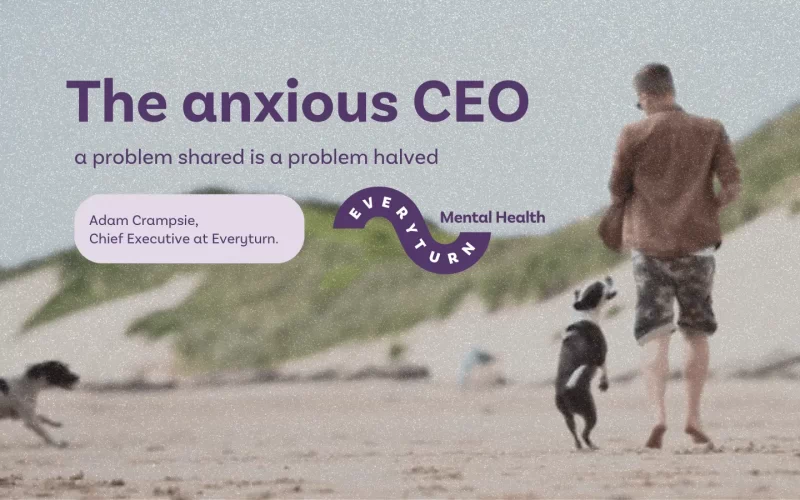
Talking about mental health can feel tough sometimes. But reaching out for help or sharing our feelings can make us feel heard, understood, and supported – and this applies at work too!
It could be that you’re not feeling your best, or maybe you’ve noticed that a colleague doesn’t seem like their usual self. Whether this advice is for you or someone else, let’s look at some ideas and tips for starting a conversation about mental health at work.
What are some signs someone might be struggling with their mental health?
- Changes in mood
- Feeling tired or low in energy
- Feeling worried a lot of the time
- Changes in appetite
- Stomach problems
- Chest pains
- Finding it hard to relax
- Shakiness
- Feeling overwhelmed
- Feeling hopeless
These are just a few of the signs associated with some common mental health problems like stress, anxiety and low mood, but everyone can experience these differently. These feelings can be difficult manage and impact on your day-to-day life.
Find out more about common symptoms with mental health problems.
I’m noticing some of these signs in myself, or I’ve noticed them with someone I work with, what can I do?
It can be really hard to carry on as “normal” when we aren’t feeling good mentally, but it can feel even more difficult when doing it alone. Here are some helpful tips for discussing mental health at work.
What to do if you’re struggling
Choose the right place and the right time
When talking about your mental health with someone at work, it’s a good idea to choose a location that you feel comfortable in and where you won’t be interrupted. Some ideas could be:
- In a meeting room at work over a cup of tea/coffee
- During a lunch break
- On a walk
- Over a video or phone call if that feels more comfortable for you
Prepare ahead
Talking about our mental health can be tough sometimes, so it might be helpful to jot down some things you’d like to discuss. There might be work-related issues that are affecting your mental health that you’d like support with, or it might not be work related at all – but you just want a chat to relieve some stress.
Be kind to yourself
When you’re discussing your own mental health, taking some time for yourself before and after can be really helpful.
Doing something that you enjoy, such as spending time with friends or family, getting some exercise, reading a book, or going for a walk in a green space, can help improve your wellbeing.
How to support a colleague who’s struggling
Ask them where works best for them
If you’re checking in with someone else about how they’re feeling, you could ask them where they’d prefer to have the conversation beforehand.
Sometimes, a listening ear is all someone needs
If you’re planning to have a conversation with someone about their mental health, remember that you don’t need to be able to solve someone’s problems or have all the answers – just taking the time to listen supportively is often all someone needs. If you feel like it might be helpful, you could think about some resources or information to signpost to if they need it.
For some tips and advice on talking to someone else about their mental health, take a look at our Advice Hub article: I’m worried about someone’s mental health.
You can find some useful resources here from Mental Health UK.
Encourage them to be kind to themselves
Encouraging your colleague to do some of the things they enjoy can be really helpful. Talking about our mental health can feel quite tough sometimes, so you could remind them to take some time for themselves after the conversation to do the things they enjoy, or things that help improve their wellbeing.
The topic of suicide and crisis at work
If you’re feeling suicidal, it’s really important to speak to someone about how you’re feeling.
If you’re worried that someone else might be feeling suicidal, it’s best to ask them directly, empathetically and without judgement. Asking someone directly if they are feeling suicidal does not make them more likely to take their life. If you’d like to feel more comfortable talking about suicide, we’d recommend taking the Zero Suicide Alliance‘s free suicide training course. In this course you’ll learn how to have a potentially life-saving conversation with someone you’re worried about.
See below for useful contacts for getting urgent help.
We know that talking about mental health can be tough, especially in a work setting. But, encouraging these kinds of conversations both inside and outside of work can have a really positive impact on you and the people you work with.
For more advice on talking about mental health at work, you could visit:
- Talking about mental health at work – Mental Health UK
- How to support mental health at work – Mental Health Foundation
- ‘Little tips for helping someone open up when something’s up’ – The Samaritans
Getting urgent help
If you or someone else is in immediate danger of hurting yourself or someone else, call 999 or visit your local A&E department. You should be taken as seriously as a physical emergency.
If there is no immediate danger, here are some useful links:
- NHS urgent mental health helpline.
- Samaritans (24/7 confidential support by phone) – call 116 123
- Shout Crisis Text Line (24/7 confidential support by text message) – text ‘SHOUT’ to 85258, or text ‘YM’ if you’re under 19




